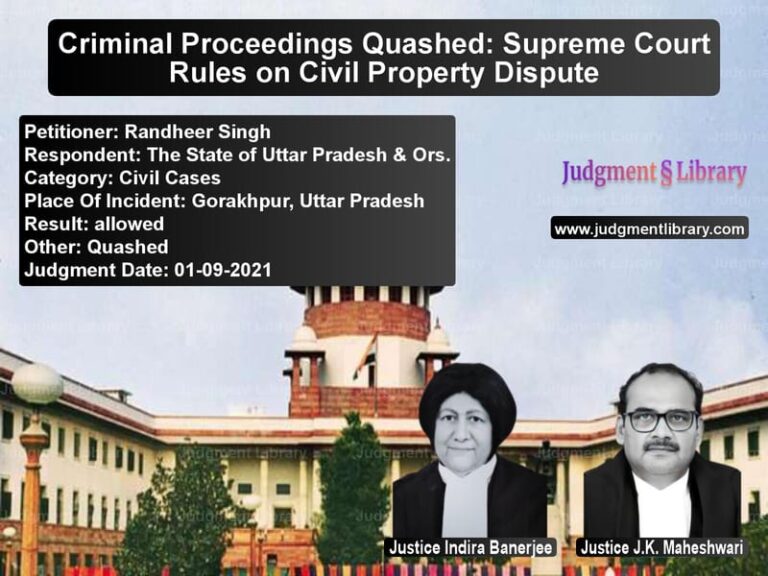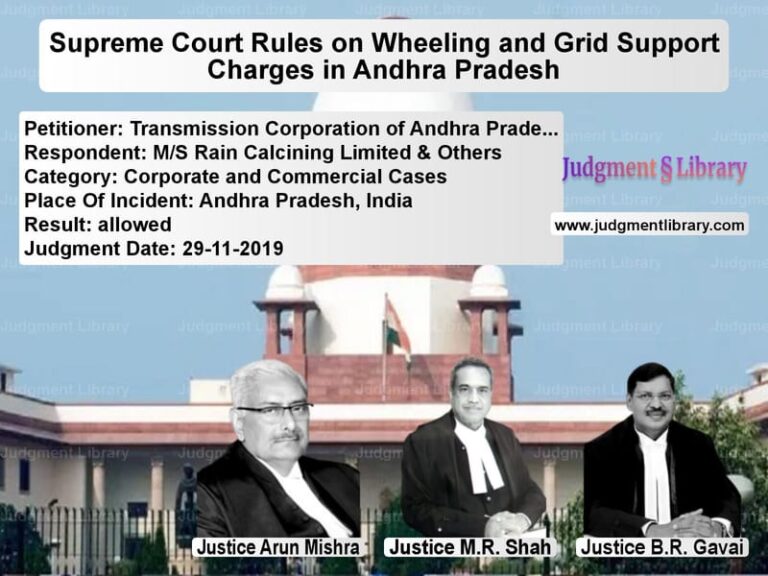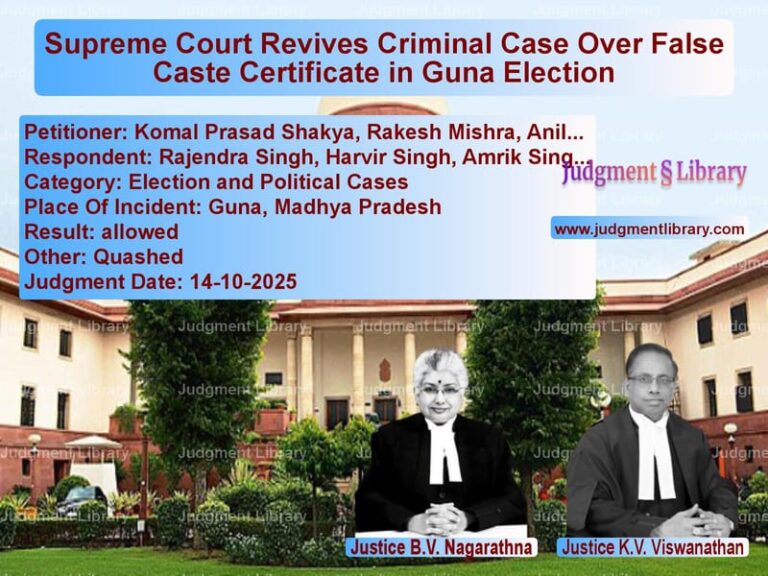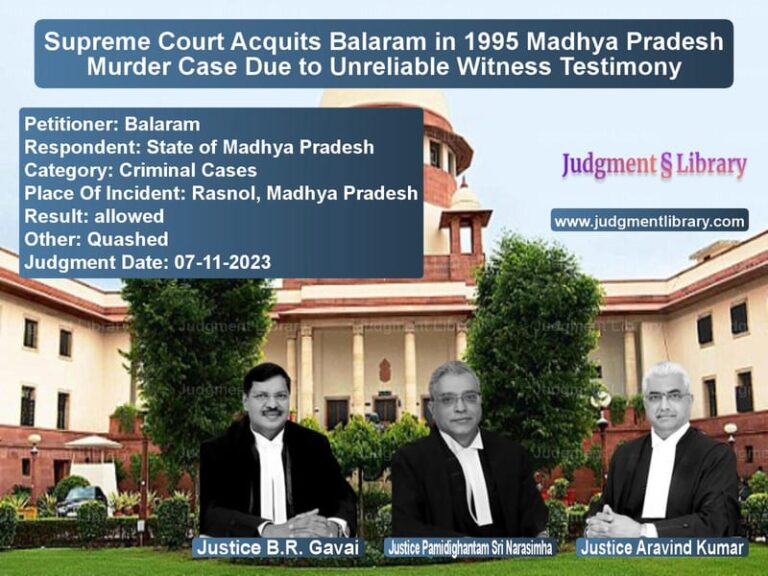Bank Fraud Case: Supreme Court Orders Reconsideration of Convict’s Sentence Suspension
The Supreme Court of India, in a crucial ruling, has set aside the Karnataka High Court’s decision that denied the suspension of sentence for N. Ramamurthy, convicted in a large-scale bank fraud case. The judgment focuses on errors in the High Court’s approach in determining the duration of the sentence, misinterpretation of legal provisions, and the improper application of precedent. The case highlights significant concerns surrounding fair trial rights and judicial review in financial fraud cases.
Background of the Case
The case involves the fraudulent activities carried out between 1995-96 by the appellant, N. Ramamurthy (Accused No. 2), and his co-accused (Accused No. 1), both of whom worked at the State Bank of Mysore. Ramamurthy was employed as a clerk, while the co-accused was a manager. They were found guilty of multiple financial crimes, including forgery, misappropriation of funds, and criminal conspiracy.
The prosecution alleged that the accused:
- Fraudulently debited a total of ₹23,53,090 from various bank accounts, including savings accounts, current accounts, and term deposits.
- Illegally credited the misappropriated amount into personal accounts by forging withdrawal slips.
- Created a fictitious name, K. Prabhakara, to be added to an existing savings account and used forged signatures to withdraw ₹9,46,399.
- Approved unauthorized overdrafts and misappropriated substantial amounts.
During the trial, Accused No. 1 passed away, and the case against him abated. However, the Special Court found Ramamurthy guilty of various offenses under the IPC and the Prevention of Corruption Act, 1988, and sentenced him to multiple prison terms, which were to run concurrently.
Trial Court Judgment
On October 22, 2018, the Trial Court sentenced Ramamurthy as follows:
- 7 years rigorous imprisonment and ₹50,000 fine under Section 120B (criminal conspiracy) IPC.
- 7 years rigorous imprisonment and ₹50,000 fine under Section 420 (cheating) IPC.
- 7 years rigorous imprisonment and ₹50,000 fine under Section 409 (criminal breach of trust) IPC.
- 7 years rigorous imprisonment and ₹50,000 fine under Section 468 (forgery) IPC.
- 3 years rigorous imprisonment and ₹25,000 fine under Section 471 (using forged documents) IPC.
- 7 years rigorous imprisonment and ₹50,000 fine under Section 477A (falsification of accounts) IPC.
- 7 years rigorous imprisonment and ₹50,000 fine under Section 13(2) read with Sections 13(1)(c) and (d) of the Prevention of Corruption Act.
The court ruled that all sentences would run concurrently, effectively limiting his imprisonment to seven years.
High Court’s Controversial Denial of Sentence Suspension
Ramamurthy filed an appeal before the Karnataka High Court, seeking suspension of his sentence under Section 389 of the Code of Criminal Procedure (CrPC). The High Court denied his request on January 3, 2019, and reiterated its stance on January 29, 2019, misinterpreting the sentence duration as 45 years instead of 7 years. The High Court also reasoned that his age-related ailments did not warrant suspension.
The High Court held that the accused’s position in the bank was immaterial, and his crimes were serious enough to reject his plea. The court also cited the Navjot Singh Sidhu v. State of Punjab (2007) case to justify its decision, which the Supreme Court later deemed inapplicable.
Arguments Before the Supreme Court
Appellant’s Arguments:
- The High Court fundamentally erred in assuming the sentence was 45 years, despite the trial court’s explicit ruling that all sentences would run concurrently.
- The appellant’s request was for a suspension of sentence, not conviction, making the High Court’s reliance on Navjot Singh Sidhu inapplicable.
- The High Court failed to consider his advanced age and medical ailments.
- Legal precedent dictates that sentence suspension should be granted unless there are exceptional circumstances preventing it.
Respondent’s Arguments:
- The prosecution argued that the evidence against the appellant was strong, and sentence suspension should not be granted.
- The prosecution supported the High Court’s finding that Ramamurthy’s crimes were serious enough to warrant imprisonment.
Supreme Court’s Ruling
The Supreme Court overturned the High Court’s decision, citing two major errors:
- The High Court wrongly calculated the total sentence as 45 years, failing to recognize the trial court’s order that all sentences would run concurrently.
- The High Court applied the wrong legal principle by considering the criteria for suspension of conviction rather than suspension of sentence.
The Supreme Court stated:
“It is not far to seek that when the High Court assumed that the appellant is to serve 45 years in prison, its consideration of the prayer for suspension of execution of sentence took entirely different dimensions. The applications ought to have been considered while keeping in view the fact that with concurrent running of sentences, the maximum period for imprisonment envisaged by the order of the Trial Court is seven years.”
The Supreme Court ruled that the High Court had acted on incorrect premises and ordered a fresh hearing for the appellant’s plea for suspension of sentence.
Conclusion
This judgment highlights the significance of accurate legal interpretation in criminal proceedings. It reaffirms that appellate courts must ensure a just review process, especially in cases where a trial court’s ruling is misrepresented. The Supreme Court’s order ensures that the appellant’s plea for sentence suspension will be reconsidered with due diligence, emphasizing fair trial principles.
Petitioner Name: N. Ramamurthy.Respondent Name: State by Central Bureau of Investigation, A.C.B., Bengaluru.Judgment By: Justice Dinesh Maheshwari, Justice Abhay Manohar Sapre.Place Of Incident: Bengaluru, Karnataka.Judgment Date: 26-04-2019.
Don’t miss out on the full details! Download the complete judgment in PDF format below and gain valuable insights instantly!
Download Judgment: N. Ramamurthy vs State by Central Bur Supreme Court of India Judgment Dated 26-04-2019.pdf
Direct Downlaod Judgment: Direct downlaod this Judgment
See all petitions in Fraud and Forgery
See all petitions in Money Laundering Cases
See all petitions in Bail and Anticipatory Bail
See all petitions in Judgment by Dinesh Maheshwari
See all petitions in Judgment by Abhay Manohar Sapre
See all petitions in allowed
See all petitions in Remanded
See all petitions in supreme court of India judgments April 2019
See all petitions in 2019 judgments
See all posts in Criminal Cases Category
See all allowed petitions in Criminal Cases Category
See all Dismissed petitions in Criminal Cases Category
See all partially allowed petitions in Criminal Cases Category







